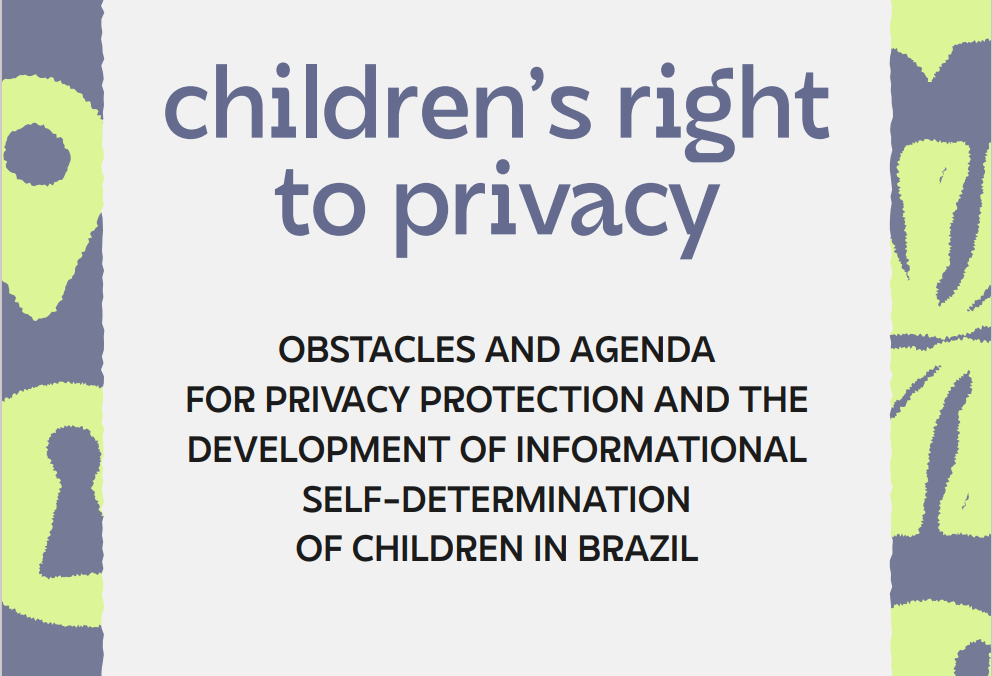
Alana Institute and InternetLab release report alerting about risks to children’s and adolescents’ privacy in Brazil
Document discusses the dangers of commercial exploitation of personal data, biometric data collection and other violations of rights of children and adolescents.
Although discussions about privacy and data protection have lately been given a growing space in Brazil, the debate is still scarce when it comes to children’s and adolescents’ rights. In order to alert about the occurrence of policies and actions from both public and private agents that may put privacy of children and adolescents at risk, the program Children and Consumption, carried out by Alana Institute, releases the report “Children’s right to privacy: obstacles and agenda for protection of privacy and informational self-determination of children”, written in collaboration with InternetLab.
The report highlights the way in which the massive collection and treatment of personal data from children and teenagers in social platforms may represent a risk to their safety and physical and psychological integrities, considering the possibility of leakage or unauthorized exposure of their information. The document also highlights the ways in which the commercial use of these personal data – for example, for directing behavioral advertising – may undermine the development of children and adolescents, who do not yet dispose of power of judgment to comprehend the persuasive character of such advertising.
“The majority of the technologies and digital platforms was not conceived for children and adolescents and does not consider the particularities of their development phase. It is undeniable, however, that they represent some of the main users of those applications and digital platforms that operate in a business model based on the commercial exploitation of personal data, which, in itself, challenges the protection of autonomy and development of children and adolescents. Facing this scenario, the report seeks to publicly expose, in an urgent manner, the daily violations of privacy and of personal data protection of children and adolescents in Brazil. It also demonstrates how these violations disproportionately target groups in situation of social vulnerability”, affirms Marina Meira, lawyer of the program Children and Consumption, from Alana Institute.
Another risk pointed out by the organizations is the fact that children and adolescents in Brazil are being compulsorily submitted to the collection of biometric data, especially in public services as hospitals and public transport. The use of these biometric technologies without respecting data protection principles (such as appropriateness and necessity) creates risks, as identity theft, and reinforces a vigilance apparatus that ends up often targeting children and adolescents since their birth.
The report also alerts about threats to children’s and adolescents’ privacy in face of a longer screen time use during the pandemic, which increases their exposure to risks as cyber bulling and intimate image leakage. Besides that, the report alerts to cases involving illegal exposure of sensitive personal data of children and adolescents victimized by violence, as a result of the datification of the justice system.
“The recrudescence of conservatism in the last few years is directly associated to the social difficulty in understanding that children and adolescents have right to privacy, which, consequently, is directly related to other social problems. An example of that is sexual education, which is not consensually understood as an initiative to protect them and help them identify different violent practices. Besides that, the lack of digital education also gives way for children and adolescents to become vulnerable in different situations. For that reason, incentives to digital and sexual education, as well as the need for the justice system to protect children’s and adolescents’ data, are fundamental points to fight the risks and violence perpetrated on online and offline scenarios”, explains Fernanda K. Martins, coordinator of Inequalities and Identities area of InternetLab.
The report “Children’s right to privacy: obstacles and agenda for protection of privacy and informational self-determination of children” was presented by Alana Institute, within the program Children and Consumption, and by InternetLab to the United Nation’s Special Rapporteur on the Right to Privacy, in a public consultation that gathered opinions and researches about children’s and adolescents’ right to privacy, and the way it influences their development and autonomy.